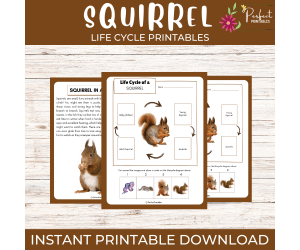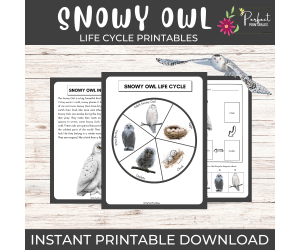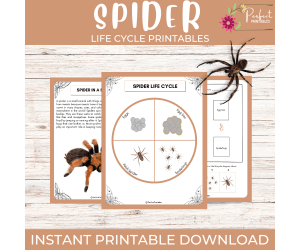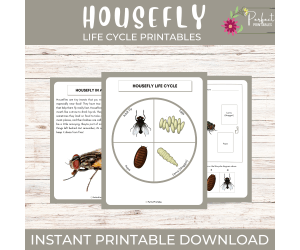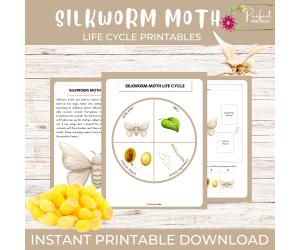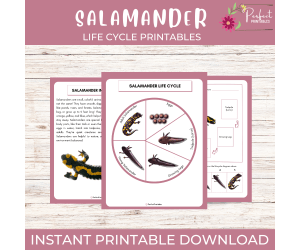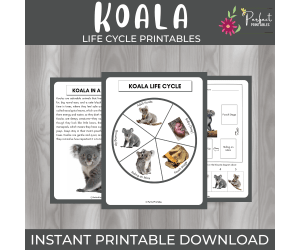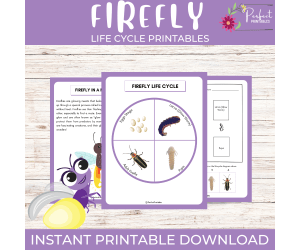2,806 products added recently
Biology: Parts of and Anatomy of
Life Cycle of a Peach Tree Worksheet | Plants, Botany Unit Study
Biology, Life Sciences, Science, Nature & Plants, STEM, Kindergarten, Preschool, Grade 1, 2, 3, Parts of and Anatomy of, Worksheets & Printables, Flashcards, Coloring Pages, Worksheets
Help your students explore the amazing journey of a peach tree with this fun and easy-to-follow worksheet! This Life Cycle of a Peach Tree activity is perfect for young learners who are just beginning to understand how plants grow and change over time. From a tiny seed to a tree full of juicy peaches, this resource walks kids through each stage of the peach tree life cycle in a way that’s simple, visual, and engaging. Designed with hands-on learning in mind, this worksheet encourages curiosity, critical thinking, and a love for nature and science. What’s Included In this worksheet? A clear and labeled life cycle chart of a peach tree Cut-and-paste sequencing activity for interactive learning Fun peach tree facts to build background knowledge Bonus coloring page for a creative extension This life cycle worksheet is Perfect For: Botany or plant science units Spring and seasonal science themes Gardening studies or farm-themed lessons Homeschool or classroom science centers This peach tree life cycle worksheet is a great way to mix science and fun—while helping kids build a strong understanding of plant growth and nature’s patterns!
Author Perfect_Printables
Rating
Tags Peach Tree Life Cycle, Peach Tree Worksheet, Plant Science Unit, Botany For Kids, Life Cycle Printables, Peach Tree Activities, STEM Plant Study, Nature Study Worksheets, Preschool Plant Science, Montessori Plant Unit
Plants - Anatomy of the Flowering Plant - Middle School Science
Science, Life Sciences, Biology, Grade 6, 7, 8, 9, Parts of and Anatomy of, Worksheets & Printables
Plants - Anatomy of the Flowering Plant - Middle School Science This comprehensive teaching resource is catered to educators focused on delivering engaging and understandable science lessons. It's perfect for middle school students, offering a deep-dive into plant anatomy. Package Components: Animated PowerPoint presentation: A dynamic tool that introduces key topics in an interactive format. Helps students identify and understand the functions of different plant organs including roots, stems, leaves, and flowers. Emphasis on terms such as 'transpiration', 'guard cells', 'stomata', 'xylem', 'phloem vessels', and elements like chlorophyll,and chloroplasts. A look at the process of photosynthesis with clear illustrations of flower parts along with identification markers for ovule and pollen grain as female and male reproductive cells respectively. Worksheets: Synchronized with PowerPoint content to reinforce concepts learnt during classes or as homework assignments – adaptable depending on each group's unique needs. Worksheets come complete with answers to reduce teacher workload. Educational Assets Include: Foldable & Flip it:Innovative opportunities for learners to create personalised notes or their own questions from given answers regarded as crucial literacy development tools. Cut-and-Stick Activity: An enhancement tool aiding note-making skills. Facts are made accessible at a glance through fact sheets, while Taboo cards drive engagement. Further available tools Resources such as self-assessment checklists help track student progress.An Exit ticket quiz serves as a quick session recap tool. It’s all part of this comprehensive educational pack – designed to boost literacy and confidence in oral presentations. A suggested lesson plan is also included, featuring interchangeable resources for customised teaching approaches. To round it off, there are thirteen meticulously arranged educational tools to relief teacher's planning load. In Conclusion... 'Plants - Anatomy of the Flowering Plant - Middle School Science' breathes life into lessons by integrating scientific facts into interactive learning experiences.
Author Elf off the Shelf Resources
Tags Plant Anatomy, Flowering Plant, Biology, Interactive Learning, Science Education, Flower Anatomy Activity
Life Cycle of a Polar Bear | Arctic Animal Unit Study with Fun Facts!
Winter, Seasons, Holiday & Seasonal, Montessori, Geology, Earth and Environmental Sciences, Science, Animals, Life Sciences, Biology, Kindergarten, Preschool, Grade 1, 2, 3, Projects, Activities, Bulletin Boards, Classroom Decor, Posters, Flashcards, Worksheets & Printables, Parts of and Anatomy of, Coloring Pages, Worksheets
Have you ever wondered how a tiny polar bear cub grows into a strong, powerful bear? In this exciting Arctic animal unit, we will explore the incredible life cycle of a polar bear and discover how these amazing creatures survive in the icy Arctic. Get ready to learn, cut, paste, and color! What’s Inside Your Polar Bear Life Cycle Worksheet? Polar Bear Fun Facts – Learn where polar bears live, what they eat, and how they survive in freezing temperatures! Life Cycle Diagram – A simple and clear chart showing each stage of a polar bear’s life, from cub to adult. Cut-and-Paste Activity – Arrange the life cycle in order by cutting and pasting the stages correctly. Flashcards – Use these picture cards to remember the different stages of a polar bear’s journey. Bonus Coloring Page – Have fun coloring a playful polar bear in its icy home! Why This Worksheet is Perfect for You! It makes learning about polar bears fun and interactive. You’ll practice sequencing skills with a hands-on cut-and-paste activity. It helps you understand how polar bears grow and adapt to the Arctic. You can show your creativity with a special coloring page! What Will You Learn? The four stages of a polar bear’s life—from newborn cub to mighty adult. How polar bears survive in the freezing Arctic. Why polar bears are important to the environment and how we can help protect them. How to use problem-solving and sequencing skills in a fun way! Let’s dive into the icy world of polar bears and explore their incredible life cycle together!
Author Perfect_Printables
Tags Polar Bear Life Cycle, Life Cycle Of A Polar Bear, Arctic Animal Life Cycle, Life Cycle Activities, Unit Study , Bear Coloring Page, Bear Cut And Paste Activities
Life Cycle of a Squirrel Worksheet- Animal Science Unit Study
Montessori, Animals, Life Sciences, Science, Biology, STEM, Kindergarten, Preschool, Grade 1, 2, 3, Posters, Classroom Decor, Parts of and Anatomy of, Worksheets & Printables, Flashcards
Let's learn and discover the fascinating life of one of the most energetic animals in nature—the squirrel! This is a fun and interactive resource designed to help young learners understand how squirrels grow, change, and thrive in the wild. Through engaging visuals and hands-on activities, students will explore each stage of the squirrel’s life in a way that’s easy to understand and fun to follow. What’s Included In This File: Squirrel Overview: A simple and kid-friendly introduction to squirrels, their habitats, and their role in the ecosystem. Life Cycle Diagram: A clearly labeled chart showing the journey from baby squirrel (kit) to adult. Cut-and-Paste Activity: A fun sequencing task to help kids organize and remember each life stage. Flashcards: Visual aids to reinforce vocabulary and science learning. Bonus Coloring Page: A cute squirrel to color while reviewing what they’ve learned. This Project is Perfect For Animal science or forest animal units Fall-themed lessons or outdoor nature studies Homeschool, classroom centers, or early finishers Students who love animals and wildlife What You Will Learn from this worksheet? Learn the four main stages of a squirrel’s life Understand how squirrels grow and survive in their environment Practice sequencing, observation, and science vocabulary This worksheet pack combines creativity and science to make learning about squirrels exciting and memorable for kids!
Author Perfect_Printables
Rating
Tags Squirrel Life Cycle, Squirrel Worksheet, Animal Science Unit, Homeschool Science, Biology For Kids, Squirrel Activities, STEM Animal Study, Nature Study For Kids, Preschool Science, Squirrel Growth Stages
Life Cycle of a Snowy Owl Worksheet- Winter Animal Science Unit Study
Animals, Life Sciences, Science, Biology, Winter, Seasons, Holiday & Seasonal, Preschool, Kindergarten, Grade 1, 2, 3, 4, Coloring Pages, Worksheets, Worksheets & Printables, Parts of and Anatomy of, Workbooks, Projects, Activities
Introduce your students to the wonders of the Arctic with this Life Cycle of a Snowy Owl Worksheet – Winter Animal Science Unit Study . This engaging, no-prep activity is designed to help learners explore the unique life stages of the snowy owl while building key science and vocabulary skills. What’s Included In This Winter Bird Science Unit Pack? Life Cycle of the Snowy Owl diagram worksheet Cut-and-paste activity for sequencing the life cycle Snowy Owl in a nutshel Fun Facts Coloring Page Flashcard Why Teachers Love It: • Integrates seamlessly into life science and seasonal studies • Strengthens sequencing and vocabulary skills • Easy to adapt across grade levels • No prep required – just print and use Perfect For: • Winter animal and Arctic ecosystem unit studies • Bird life cycle lessons • Science centers or interactive notebooks • Homeschool, small group, or whole-class learning Bring science and nature together with this hands-on snowy owl life cycle worksheet —a fun way to explore Arctic wildlife during your winter lessons!
Author Perfect_Printables
Rating
Tags Snowy Owl Life Cycle, Winter Animal Science Unit, Life Cycle Of Snowy Owl, Arctic Bird Life Cycle, Owl Life Cycle Cut And Paste, Winter Animal Life Science, Snowy Owl Fact, Snowy Owl Adaptations, Winter Bird Life Cycle
Life Cycle of a Spider | Spider Life Cycle With Cut & Paste Activities
Animals, Life Sciences, Science, Biology, Insects, Toddler, Kindergarten, Preschool, Grade 1, 3, Coloring Pages, Worksheets, Worksheets & Printables, Parts of and Anatomy of, Bulletin Boards, Classroom Decor, Posters
Dive into the amazing life cycle of a spider, one of the most powerful insect in nature. This simple and engaging worksheet is perfect for helping students learn about how these incredible insect grow and live. What’s Inside the spider Life Cycle Worksheet? Spider Overview: A short description of what makes Spider special, where they live, and how they help their environment. Life Cycle Diagram: A clear and labeled chart showing each stage of a Spider ’s life, from egg to adult. Cut-and-Paste Activity: A fun way for kids to organize and sequence the life stages of a Spider. Flashcards: Visual tools to help students remember the steps of the life cycle. Bonus Coloring Page: A creative activity to color a Spider for kids This Worksheet is Perfect For: Science lessons about bugs and insects Homeschool studies on wildlife and ecosystems. Classroom centers and hands-on activities. Learning Goals: Learn the stages of a spider’s life, from egg to full-grown adult. Understand how spider adapt to their habitats and why they are important. Build sequencing and problem-solving skills through interactive activities. This resource is a great mix of science and creativity. It’s designed to make learning about spider fun, simple, and memorable for kids!
Author Perfect_Printables
Tags Life Cycle Of A Spider, Spider Life Cycle, Bugs And Insect Life Cycle, Spider Unit Study, Spider Coloring Page, Spider Flashcard
Life Cycle of a Pea Plant Worksheet - Plant Science Unit Study Pack
Montessori, Nature & Plants, Life Sciences, Science, Biology, STEM, Kindergarten, Preschool, Grade 1, 2, 3, Projects, Activities, Posters, Classroom Decor, Flashcards, Worksheets & Printables, Parts of and Anatomy of
Let’s learn more about amazing life of a pea plant with our worksheet! This fun and easy-to-use worksheet pack is perfect for introducing students to the stages of a plant’s growth. From tiny seed to blooming plant, kids will explore how pea plants grow, develop, and produce food. What’s You Will Get with This Study Pack? Plant Overview: A short and clear introduction to pea plants, including where they grow and why they’re important. Life Cycle Diagram: A colorful and labeled chart that shows the full journey—from seed, sprout, and seedling to mature plant. Cut-and-Paste Activity: An interactive way for students to practice sequencing the life stages. Flashcards: Helpful visual aids for remembering each part of the plant life cycle. Bonus Coloring Page: A relaxing, creative activity to reinforce learning. This Worksheet Is Ideal For: Plant science and biology units Spring-themed classroom lessons Homeschool gardening studies Hands-on centers and quiet learning activities Your Learning Goals: Identify each stage of the pea plant’s life cycle Understand how seeds grow into food-producing plants Build sequencing and observation skills through fun and interactive tasks This resource brings plant science to life and helps kids see how amazing and important plants really are!
Author Perfect_Printables
Rating
Tags Pea Plant , Life Cycle, Plant Science Unit, Life Cycle Printables, Nature Study For Kids, Botany Unit, Legume Plant Growth, Seed To Plant Stages, Science Printables, Classroom Plant Unit
The Plants We Eat: A Parts of a Plant Anchor Charts and Posters
Science, Life Sciences, Nature & Plants, Biology, Kindergarten, Preschool, Grade 1, Parts of and Anatomy of, Worksheets & Printables
Did you know we can eat all parts of plants. This parts of a plant anchor chart posters includes real images of fruits and vegetables for students to familiarize themselves with all the parts of a plant they can eat! This poster set includes flowers, seeds, leaves, stems, roots, and fruits. There are 6 images for each plant part. Pictures Included: Flowers: artichoke, broccoli, cauliflower, dandelion, honeysuckle, squash blossom Fruits: apple, banana, blueberry, lime, pepper, raspberry Leaves: kale, lettuce, mint, parsley, purple cabbage, spinach Roots: carrot, garlic, onion, parsnip, radish, sweet potato Seeds: almonds, beans, coconut, corn, peas, sesame seeds Stems: asparagus, bamboo shoots, celery, leek, rhubarb, scallions How to Use: These charts can be used as wall decor in a science center or as an instructional tool to teach about the plants we eat. By relating the science standard of identifying parts of a plant to foods that students commonly eat, it will ensure that students have fun and stay engaged with learning about plants! Where to Use: Wall Display in a Science Center - Place these posters on the wall of a science center while you are learning about the parts of plants. They can also be placed in a science center simply as a reference tool for students to use while completing other plant based activities. Instructional Tool - These posters make an excellent instructional tool for teachers to use to introduce to students the concept of parts of a plant in relation to the foods we eat. The real photographs in this set provide students with easy to recognize images of different edible plants. Students will love seeing all the pictures of the different kinds of plants that they can actually eat. These anchor charts and posts are no prep. The posters just need to be printed out and laminated for durability if desired.
Author The Connett Connection
Tags Plants We Eat, Parts Of A Plant
Life Cycle of Arctic Fox Worksheet- Winter Animal Science Unit Study
Animals, Life Sciences, Science, Biology, Kindergarten, Preschool, Grade 1, 2, 3, 4, Coloring Pages, Worksheets, Worksheets & Printables, Workbooks, Parts of and Anatomy of
Bring science to life with this Life Cycle of the Arctic Fox Worksheet – Winter Animal Science Unit Study . This no-prep activity is a perfect addition to your seasonal science lessons, helping students explore the fascinating life cycle of the Arctic fox in a fun and engaging way. What’s Included In this Arctic Fox Unit Study? Life Cycle of the Arctic Fox diagram worksheet Cut-and-paste activity for sequencing the life cycle Arctic Fox in a Nutshell Coloring page Life cycle flashcards Fun facts Why Teachers Love It: • Supports life science, animal studies, and seasonal themes • Builds vocabulary and sequencing skills • Easy to differentiate for a variety of grade levels • No prep required – just print and go Perfect For: • Winter animal unit studies • Arctic and tundra ecosystems lessons • Science centers or interactive notebooks • Homeschool, small groups, or whole-class activities Give your students a deeper understanding of Arctic animals with this hands-on life cycle worksheet —a fun blend of science and creativity for your winter classroom!
Author Perfect_Printables
Rating
Tags Arctic Fox Life Cycle Worksheet, Winter Animal Science Unit Printable, Arctic Animals Life Cycle, Wildlife Science Worksheet, Arctic Animal Study, Life Cycle Cut And Paste, Winter Animal Classroom Worksheets, Life Cycle Science Unit, Arctic Animal
Life Cycle of a Tulip Worksheet - Flowering Plant Science Unit Study
Spring, Seasons, Holiday & Seasonal, Montessori, Biology, Life Sciences, Science, Nature & Plants, STEM, Kindergarten, Preschool, Grade 1, 2, 3, Bulletin Boards, Classroom Decor, Posters, Flashcards, Worksheets & Printables, Parts of and Anatomy of, Coloring Pages, Worksheets
Have you ever wondered how a tulip grows from a tiny bulb into a beautiful blooming flower? This Life Cycle of a Tulip Worksheet is a fun and interactive way to learn about the stages of a tulip’s life. Perfect for science lessons, homeschool studies, and spring-themed activities, this worksheet helps students explore the world of plants in a simple and engaging way! What you will get in this printable? Tulip Flower Overview – Learn what makes tulips special, where they grow, and why they bloom in the spring. Life Cycle Diagram – A clear and labeled chart showing each stage, from bulb to full bloom. Cut-and-Paste Activity – A hands-on way for kids to sequence the life stages of a tulip. Flashcards – Visual tools to help students remember each stage of the tulip's growth. Bonus Coloring Page – You will get a tulip coloring page also! This Worksheet is perfect for: Helps students understand plant growth in a simple and visual way. Encourages hands-on learning with fun, interactive activities. Great for classroom science lessons, homeschooling, or springtime studies. Builds sequencing, problem-solving, and observational skills. What Will You Learn? The different stages of a tulip’s life, from bulb → sprout → growing plant → bud → blooming flower . How tulips grow, their needs, and their role in nature. Fun facts about tulips, including how they change with the seasons. Let’s explore the amazing life cycle of a tulip together and make plant science fun!
Author Perfect_Printables
Tags Tulip Life Cycle, Tulip Worksheet, Flowering Plant Science, Plant Life Cycle Printables, Homeschool Botany, Biology For Kids, Tulip Activities, STEM Plant Study, Spring Flowers Study, Plant Growth Stages
Black-backed jackal life cycle: Savanna Animal Science Unit Study
Animals, Life Sciences, Science, Biology, Toddler, Kindergarten, Preschool, Grade 1, 3, Coloring Pages, Worksheets, Worksheets & Printables, Parts of and Anatomy of, Bulletin Boards, Classroom Decor, Posters
Learn more about the life cycle of a Black-Backed Jackal with these worksheet. This science unit study is perfect for Pre-K to 3rd grad students to know how these clever canines grow, live, and survive on the African savanna. What’s Included in this Jackal Life Cycle Worksheet? jackal In a nutshell Life Cycle Diagram: A clear and labeled chart showing each stage of a jackal Cycle Cut-and-Paste Activity: A fun way for kids to organize and sequence the life stages of a jackal Flashcards: Visual tools to help students remember the steps of the life cycle. Coloring Page: A creative activity to color a jackal for kids Fun facts about jackal Matching Activity This Worksheet is Perfect For: Science lessons about Savanna Animals Homeschool studies on wildlife and grassland ecosystems. Classroom centers and hands-on activities. Learning Goals: Learn the stages of a jackal life from baby to Adult Jackal Understand how jackal adapt to their habitats and why they are important. Build sequencing and problem-solving skills through interactive activities. This resource is a great mix of science and creativity. It’s designed to make learning about jackal fun, simple, and memorable for kids!
Author Perfect_Printables
Rating
Tags Seasonal Science Activity, Jackal Life Cycle, Savanna Animals, African Animals Life Cycle, Animal Life Cycle, Jackal Worksheet, Predator Life Cycle, Savanna Science Unit, African Wildlife Study, Nimal Science Kids
Life Cycle of a Dolphin Worksheet | Ocean Mammals Unit Study
Montessori, Animals, Life Sciences, Science, Biology, STEM, Kindergarten, Preschool, Grade 1, 2, 3, Bulletin Boards, Classroom Decor, Posters, Parts of and Anatomy of, Worksheets & Printables, Coloring Pages, Worksheets
Are you ready to dive into the amazing world of dolphins? This Life Cycle of a Dolphin Worksheet is a fun and interactive way to learn about how these intelligent marine mammals grow and live in the ocean. Perfect for science lessons, homeschool studies, or ocean animal units, this worksheet makes learning fun and engaging! What’s Inside in this file Dolphin Overview – Learn what makes dolphins special, where they live, and how they survive in the ocean. Life Cycle Diagram – A clear and labeled chart showing each stage of a dolphin’s life, from calf to adult. Cut-and-Paste Activity – A fun way for kids to organize and sequence the life stages of a dolphin. Flashcards – Visual tools to help students remember the steps of the life cycle. Bonus Coloring Page – A creative activity to color a dolphin while learning! This is perfect for: Helps students understand the life cycle of dolphins in a simple way. Encourages hands-on learning with interactive activities. Great for classroom science lessons, homeschooling, or marine biology units. Supports sequencing, problem-solving, and creative thinking skills. What Will You Learn? The different stages of a dolphin’s life, from baby calf to fully grown adult. How dolphins adapt to their ocean environment and why they are important. Fun facts about dolphins, including how they communicate and take care of their young. Let’s explore the amazing life cycle of dolphins together and make learning about ocean mammals exciting!
Author Perfect_Printables
Tags Dolphin Life Cycle, Dolphin Worksheet, Ocean Mammals Unit, Marine Biology For Kid, Life Cycle Printables, Homeschool Science, Biology For Kids, Dolphin Activities, STEM Marine Study, Sea Animals For Kids
Life Cycle of a Housefly Worksheet - Insect Science Unit Study
Montessori, Life Sciences, Science, Biology, Insects, Kindergarten, Preschool, Grade 1, 2, 3, Posters, Classroom Decor, Flashcards, Worksheets & Printables, Parts of and Anatomy of, Coloring Pages, Worksheets
Let’s take a closer look at one of the most common insects around us! This Life Cycle of a Housefly Worksheet helps students explore how a tiny fly grows and changes through its life. Perfect for science lessons insect studies and hands on activities this resource makes learning fun and easy for young learners What is Inside the Housefly Life Cycle Worksheet Housefly Overview A simple introduction to what houseflies are where they live and why they matter in nature Life Cycle Diagram A clear life cycle chart showing each stage of the housefly’s life egg larva pupa and adult Cut and Paste Activity A fun way for students to arrange the life cycle stages in the correct order Flashcards Visual tools to help kids remember each step of the fly’s life Bonus Coloring Page : You will get a housefly coloring page as bonus! Why This Worksheet is Great for Kids Easy to follow and made for young learners Supports science skills like sequencing and observation Perfect for classrooms homeschool or insect themed units What Will You Learn The four main stages of the housefly life cycle How a housefly changes at each stage Fun facts about flies and their role in the environment This simple and engaging worksheet makes science fun and helps kids better understand the world of insects Let’s learn all about the life of a housefly together
Author Perfect_Printables
Rating
Tags Housefly , Life Cycle, Worksheet, Insect Science Unit, Homeschool, Biology For Kids, Fly Activities, STEM Insect Study, Nature Study, Montessori
Life Cycle Of a Toad Worksheet - Animal Science Unit Study & Fun Facts
Montessori, Animals, Life Sciences, Science, Biology, STEM, Kindergarten, Preschool, Grade 1, 2, 3, Bulletin Boards, Classroom Decor, Posters, Flashcards, Worksheets & Printables, Parts of and Anatomy of, Coloring Pages, Worksheets
Have you ever seen a tiny tadpole swimming in the water? Did you know that it will one day grow legs and become a toad? In this exciting science unit, we will explore the amazing life cycle of a toad and learn fun facts about these fascinating amphibians. Get ready to learn, cut, paste, and color! What’s Inside Your Toad Life Cycle Worksheet? Toad Fun Facts – Discover where toads live, what they eat, and how they are different from frogs! Life Cycle Diagram – A simple and clear chart showing each stage of a toad’s life, from egg to adult. Cut-and-Paste Activity – Put the life cycle in the correct order by cutting and pasting the stages. Flashcards – Use these picture cards to help remember each step in a toad’s growth. Bonus Coloring Page – Have fun coloring a cute toad in its natural habitat! Why This Worksheet is Perfect for You! Makes learning about amphibians fun and interactive. Helps develop sequencing and problem-solving skills. Teaches the importance of toads in the ecosystem. Includes hands-on activities to reinforce learning. What Will You Learn? The different stages of a toad’s life—from egg to tadpole to adult toad. How toads grow, change, and adapt to life on land and in water. Why toads are important for keeping nature in balance. How to use sequencing and observation skills in a fun way! Let’s hop into learning and explore the incredible life cycle of a toad together!
Author Perfect_Printables
Tags Toad Life Cycle, Amphibian Science, Life Cycle Printables, Biology For Kids, STEM Amphibian Study, Educational Worksheets, Hands-on Science, Montessori Amphibians, , Herpetology For Kidsherpetology For Kids, Animal Life Cycles
Life Cycle of a Silkworm Moth Worksheet - Insect Science Unit Study
Montessori, Animals, Life Sciences, Science, Biology, Insects, Kindergarten, Preschool, Grade 1, 2, 3, Projects, Activities, Posters, Classroom Decor, Flashcards, Worksheets & Printables, Parts of and Anatomy of
Let’s explore the amazing transformation of the silkworm moth. This Life Cycle of a Silkworm Moth Worksheet is a fun and educational way for kids to learn about insects and how they grow. This worksheet is perfect for science lessons homeschool studies and hands on classroom activities this worksheet helps students discover the full journey of a silkworm from tiny egg to flying moth What is Inside the Silkworm Moth Life Cycle Worksheet Silkworm Overview: A simple explanation of what silkworms are where they live and how they are connected to silk. Life Cycle Diagram :A clear and labeled chart showing each stage egg larva pupa and adult moth Cut and Paste Activity: A fun hands on task to help kids arrange the life stages in the correct order Flashcards : Picture cards to help remember each step of the life cycle Bonus Coloring Page You will get a silkworm coloring page with this worksheet as bonus. Why This Worksheet is Great for Kids Easy to understand and engaging for young learners Builds science knowledge and sequencing skills Encourages observation and curiosity about insects Perfect for unit studies on insects moths or the natural world What Will You Learn: The four main stages of the silkworm moth life cycle How silkworms change at each stage of growth Why silkworms are important in nature and how they help people This resource makes learning about insects fun simple and meaningful Let us discover the life of the silkworm moth together through interactive activities and fun facts
Author Perfect_Printables
Rating
Tags Silkworm Moth, Bugs Insects, Silkworm Life Cycle, Silkworm Moth Worksheet, Insect Science Unit, Life Cycle, Silkworm Activities, Insect Study, Nature Study, Metamorphosis
Scorpion Life Cycle Worksheet | Animals Unit Study With Fun Facts!
Animals, Life Sciences, Science, Biology, Kindergarten, Preschool, Grade 1, 2, 3, Parts of and Anatomy of, Worksheets & Printables, Flashcards, Diagrams, Teacher Tools, Lesson Plans
Bring the fascinating world of scorpions into your classroom with this engaging Scorpion Life Cycle Worksheet . Designed for young learners, this resource introduces students to the unique stages of a scorpion’s life while encouraging curiosity about desert animals and their adaptations. This worksheet set is perfect for your animal science unit study , combining visual learning, hands-on activities, and fun facts to make lessons memorable. Students can explore the scorpion’s life cycle through diagrams, a cut-and-paste sequencing activity, matching tasks, and a coloring page to spark creativity. What’s Included In this scorpion life cycle pack? Scorpion short decsription Life Cycle Diagram Cut-and-Paste Life Cycle Sequencing Activity Matching Activity Flashcards for review Fun Facts About Scorpions Coloring Page Why Teachers Love It: No prep – just print and use Engages students with visuals and interactive activities Builds science vocabulary and sequencing skills Great for life cycle units, desert animal studies, or independent science centers Great For: Science lessons on animals and habitats Small group or independent work Early finishers and homework activities Homeschool unit studies With this Scorpion Life Cycle resource , your students will have fun exploring one of nature’s most unique creatures while strengthening their science skills!
Author Perfect_Printables
Rating
Tags Scorpion Life Cycle Worksheet, Life Cycle Of A Scorpion, Scorpion, Insect And Arachnid Life Cycle, Animal Science Worksheet, Scorpion Facts, Life Cycle Printables For Classroom, Arachnid Unit Study, Desert Animals Worksheet, Animal Life Cycle Activities
Life Cycle of a Cheetah Worksheet- Animal Science Unit Study
Montessori, Animals, Life Sciences, Science, Biology, STEM, Kindergarten, Preschool, Grade 1, 2, 3, Posters, Classroom Decor, Flashcards, Worksheets & Printables, Parts of and Anatomy of
Let you kids learn about the biggest wild cat with our " Life Cycle of a Cheetah Worksheet ! This engaging and kid-friendly science resource is designed to help students explore how cheetahs grow, change, and survive in the wild. With fun facts and interactive activities, learners will discover the unique life stages of the fastest land animal on Earth! What’s Included In this file? Cheetah Overview: A short and exciting introduction to cheetahs, where they live, what they eat, and what makes them special. Life Cycle Diagram: A clear, easy-to-follow chart showing each stage of a cheetah’s life—from cub to adult. Cut-and-Paste Activity: A hands-on activity that lets students cut out and sequence the stages of the cheetah’s life. Flashcards: Visual cards to help reinforce science vocabulary and life cycle steps. Bonus Coloring Page: A fun and relaxing way to review with a cheetah-themed coloring activity. This Worksheet is perfect for Animal science and wild animal units African wildlife studies Classroom centers or homeschool lessons Students who love big cats and nature What you will learn from this worksheet? Understand the stages in a cheetah’s life cycle Learn how cheetahs grow and survive in their environment Build sequencing and critical thinking skills through interactive tasks This worksheet pack is a great mix of science, fun, and creativity—perfect for helping kids connect with the wild world of cheetahs!
Author Perfect_Printables
Rating
Tags Cheetah Life Cycle, Cheetah Worksheet, Animal Science Unit, Homeschool Science, Biology For Kids, Cheetah Activities, Nature Study For Kids, Montessori Wildlife Unit, Savanna Animals, Cheetah Growth Stages
Life Cycle of a Venus Flytrap Worksheet- Plant Science Unit Study
Montessori, Life Sciences, Science, Biology, Nature & Plants, Kindergarten, Preschool, Grade 1, 2, 3, Posters, Classroom Decor, Flashcards, Worksheets & Printables, Parts of and Anatomy of
Let’s explore one of the most exciting plants in nature – the Venus Flytrap! This simple and fun worksheet helps students learn all about how this amazing carnivorous plant grows and survives. It’s a great way to spark curiosity and get kids excited about plant science. What’s Included in this Worksheet? A Short Overview : A short and easy-to-understand description of what makes the Venus Flytrap special and where it grows. Life Cycle Diagram: A clear chart showing each stage of the plant’s life, from seed to fully grown trap. Cut-and-Paste Activity: A fun hands-on way for students to put the life cycle stages in the correct order. Flashcards: You will get a flashcards set of All stages of life Bonus Coloring Page: A venus flytrap coloring page also included! This is Perfect For: Science lessons about plants and unique species Classroom centers or independent activities Homeschool plant studies Spring or nature-themed units What you will learn from this project? Understand each stage in the Venus Flytrap’s life cycle Learn how it catches insects and survives in its habitat Build sequencing and observation skills through interactive activities This resource is a fun mix of science and creativity—designed to make learning about the Venus Flytrap simple, exciting, and memorable for young learners.
Author Perfect_Printables
Rating
Tags Venus Flytrap , Life Cycle, Carnivorous Plant , Plant Science Unit, Life Cycle Printables, Homeschool Botany, Venus Flytrap Activities, STEM Plant Study, Nature Study For Kids, Montessori Botany Unit
Life Cycle of a Salamander Worksheet- Amphibian Science Unit Study
Montessori, Animals, Life Sciences, Science, Biology, STEM, Kindergarten, Preschool, Grade 1, 2, 3, Posters, Classroom Decor, Bulletin Boards, Parts of and Anatomy of, Worksheets & Printables, Flashcards, Coloring Pages, Worksheets
Have you ever wondered how a salamander grows and changes throughout its life This Life Cycle of a Salamander Worksheet is a fun and interactive way to explore the fascinating transformation of these amazing amphibians Perfect for science lessons homeschool studies and hands on activities this worksheet makes learning about salamanders exciting and easy What is Inside In this Printable? Salamander Overview Learn what makes salamanders special where they live and how they survive in their habitats Life Cycle Diagram A clear and labeled chart showing each stage from egg to adult salamander Cut and Paste Activity A hands on way for kids to organize and sequence the life stages of a salamander Flashcards Visual tools to help students remember each stage of the salamanders growth Bonus Coloring Page You will get a coloring page! This worksheet is perfect for: Helps students understand the unique life cycle of amphibians Encourages hands on learning with interactive activities Great for classroom science lessons homeschooling and nature studies Builds sequencing problem solving and observational skills You will learn: The different stages of a salamanders life from egg to larva to juvenile to adult How salamanders adapt to their environment and why they are important Fun facts about salamanders including their ability to regenerate body parts Let us explore the amazing life cycle of a salamander together and make amphibian science fun
Author Perfect_Printables
Tags Salamander Life Cycle, Salamander Worksheet, Amphibian Science, Salamander Activitie, STEM Amphibian Study, Montessori Amphibians, Herpetology For Kids, Salamander Unit Stud, Wildlife Education
Cells: The Parts of a Cell
Science, Life Sciences, Biology, Common Core, Grade 5, 6, 7, 8, Parts of and Anatomy of, Worksheets & Printables
Cells: The Parts of a Cell - An Essential Teaching Resource Cells: The Parts of a Cell is an invaluable educational resource for those aiming to enhance their students' understanding in biology, focusing specifically on cell structure and function. This teaching material is highly effective for educators teaching fifth through eighth grades. Simplified Learning Approach The unique method of presentation used in Cells: The Parts of a Cell simplifies complex ideas. Topics such as single-celled and multi-cellular organisms, human cell reproduction, as well as diffusion and osmosis are explained clearly which makes it easier even for remedial students to grasp. Diverse Layouts & Activities Detailed reading passages: These can be used during whole-class instruction or personal study sessions. Multicolored mini posters: Greatly benefits visual learners or acts as handy references during study periods. Flexible student activities: Can be implemented independently or in collaborative groups making organization effortless. Educational Standard Alignment An impressive asset of Cells: The Parts of a Cell, is its alignment with recognized standards like the Common Core State Standards plus Bloom's Taxonomy & STEM initiatives objectives ensuring enriched lessons focused on developing cognitive processes along with delivering relevant knowledge. Varying Implementation Methods Support This resource proves highly adaptable supporting multiple methods implementation depending on what best fits your class - from whole-group instruction, small-group collaborative learning to independent/home-based education. eAccessibility & Integration The provided easy-to-access PDF file ensures seamless addition to any digital education toolbox without compatibility issues. As a result, Cells: The Parts Of A Cell embodies a leading edge blend of technology and pedagogy.
Author Classroom Complete Press
Tags PDF
Life Cycle of a Koala, Australian Wildlife Unit Study fun facts
Animals, Life Sciences, Science, Biology, Kindergarten, Preschool, Grade 1, 2, 3, Parts of and Anatomy of, Worksheets & Printables, Flashcards, Diagrams, Teacher Tools, Lesson Plans
Bring Australian wildlife into your classroom with this Life Cycle of a Koala worksheet . Students will explore each stage of a koala’s development, from joey to adulthood, while learning fascinating facts about their diet, habitat, and unique adaptations. Perfect for science centers, unit studies, or literacy integration. What’s Included In This Kola life cycle pack? • A short Koala overiview • Life cycle diagram • Cut-and-paste sequencing activity • Flashcards for review and games • Matching activity for reinforcement • Fun facts about koalas • Coloring page Why Teachers Love It • Supports life science and animal studies • Engaging, hands-on activities for elementary learners • Easy to use – no prep required • Combines science, reading, and creativity • Helps students connect with real-world wildlife Great For • Australian animal unit studies • Science centers and small group work • Independent practice or homework • Early finishers • Cross-curricular learning with geography and literacy This koala life cycle activity helps students build science knowledge while having fun exploring one of Australia’s most iconic animals.
Author Perfect_Printables
Rating
Tags Life Cycle Of A Koala, Koala Life Cycle Worksheet, Australian Wildlife Unit Study, Marsupial Life Cycle Printable, Koala Science Activity, Australian Animals Worksheet, Life Cycle Of Animals Printable, Koala Facts For Kids, Australian Unit Study Worksheet, Koala Classroom Activity
Life Cycle of a Firefly | Lightning Bug Unit Study With Fun Facts!
Montessori, Animals, Life Sciences, Science, Biology, Insects, Nature & Plants, Kindergarten, Preschool, Grade 1, 2, 3, 4, 5, Posters, Classroom Decor, Bulletin Boards, Flashcards, Worksheets & Printables, Coloring Pages, Worksheets, Parts of and Anatomy of
Have you ever watched fireflies twinkle in the night sky? These little glowing insects are truly amazing! In this fun and interactive worksheet, we will explore how fireflies grow and change throughout their lives. Get ready to learn, cut, paste, and even color! What’s Inside Your Firefly Life Cycle Worksheet? Firefly Fun Facts – Learn what makes fireflies special, where they live, and why they glow! Life Cycle Diagram – A clear and easy-to-follow chart showing each stage of a firefly’s life, from egg to adult. Cut-and-Paste Activity – Put the life cycle in order by cutting and pasting the stages in the correct sequence. Flashcards – Use these picture cards to remember the different steps in a firefly’s journey. Coloring Page – Get creative and color your very own glowing firefly! Why This Worksheet is Perfect for You! It makes learning about insects fun and exciting. You’ll get to practice sequencing skills with a hands-on activity. It helps you understand how fireflies grow and why they are important to nature. You can use your creativity with a special coloring page! What Will You Learn? The four stages of a firefly’s life—from egg to glowing adult. How and why fireflies light up at night. Why fireflies are important to the environment. How to use problem-solving and sequencing skills in a fun way! I can’t wait for you to explore the incredible world of fireflies! Let’s get started and have fun learning together.
Author Perfect_Printables
Tags Firefly Life Cycle, Life Cycle Of A Firefly, Life Cycle Printable, Life Cycle Worksheets, Bugs Life Cycle, Insect Life Cycle, Cut And Paste Activities
Plants - Anatomy of the flowering Plant for Middle School
Science, Life Sciences, Biology, Grade 5, 6, 7, 8, 9, Parts of and Anatomy of, Worksheets & Printables
This fully resourced lesson on the parts of a plant includes an animated PowerPoint which: > identifies the root, stem, leaves and flowers as plant organs and; > explains the functions of the root, stem, leaf and flower; > explains the terms transpiration, guard cells, stomata, xylem, phloem, chlorophyll, chloroplast and photosynthesis; > labels the parts of the flower; > identifies the ovule and pollen grain as the female and male reproductive cells. What’s Included > Animated PowerPoint for teaching with exit ticket quiz > Flip it (pupil writes questions to given answers) > Anticipation Guides (combined starter and plenary) > Foldable (students use to make their own notes) > Cut-and-stick activity pupil uses to make their own notes) > Worksheet to support the PowerPoint > Fact sheet > Homework plus answers > Fact share worksheet > 12 Taboo cards > Pupil progress self- assessment checklist > Exit Ticket > Suggested lesson plan showing choices possible between resources This pack contains 13 resources and it is intended that the teacher uses them to build their own unique lesson to take account of student ability and time available. Literacy, oracy, self- assessment and peer assessment are all built in to the resources. These features are clearly marked on the comprehensive one-page flow chart lesson plan which shows where the logical choices between resources can be made. See more Elf Off the Shelf resources on this topic and many others
Author Elf off the Shelf Resources
Tags Label The Parts Of A Flower, Function Of The Root Stem And Leaves, Xylem And Phloem Cells, Parts Of The Plant, Transpiration Guard Cells And Chloroplasts
The Plants We Eat: A Parts of a Plant Sort
Science, Life Sciences, Biology, Nature & Plants, Preschool, Kindergarten, Grade 1, Parts of and Anatomy of, Worksheets & Printables
Did you know we can eat all parts of plants. This parts of a plant sorting activity includes real images of fruits and vegetables to sort by where they can be found on a plant. This sort includes flowers, seeds, leaves, stems, roots, and fruits. There are 6 images for each plant part. Pictures Included: Flowers: artichoke, broccoli, cauliflower, dandelion, honeysuckle, squash blossom Fruits: apple, banana, blueberry, lime, pepper, raspberry Leaves: kale, lettuce, mint, parsley, purple cabbage, spinach Roots: carrot, garlic, onion, parsnip, radish, sweet potato Seeds: almonds, beans, coconut, corn, peas, sesame seeds Stems: asparagus, bamboo shoots, celery, leek, rhubarb, scallions The plants sorting mats come in two formats. The first set are full page sorting mats where students place the pictures directly on the mats. The second set contains header cards that the picture cards can be placed under. The header cards are available in 2 sizes, one is large sized for table top activities and the other is small enough to fit in a task box. How to Use: Students will place the sorting mats on a table or on the floor. They will look at each plant picture and place it on the correct mat. Where to Use: Science Center - The teacher can place the mats and cards in the science center for students to work independently or with a partner to complete. Morning Tub or Basket - The teacher can place the mats and cards in a morning bin for students to work on while their classmates arrive to class. Small Group Activity - The teacher can lead this sorting activity with a small group of students at a time. The real photographs in this set provide students with easy to recognize images of different edible plants. These mats and cards are a low prep science center for teachers to prepare. The cards will need to be printed and cut out. This center should be laminated for durability.
Author The Connett Connection
Tags Plants We Eat, Parts Of A Plant, Science Sort, Plant Sort

















